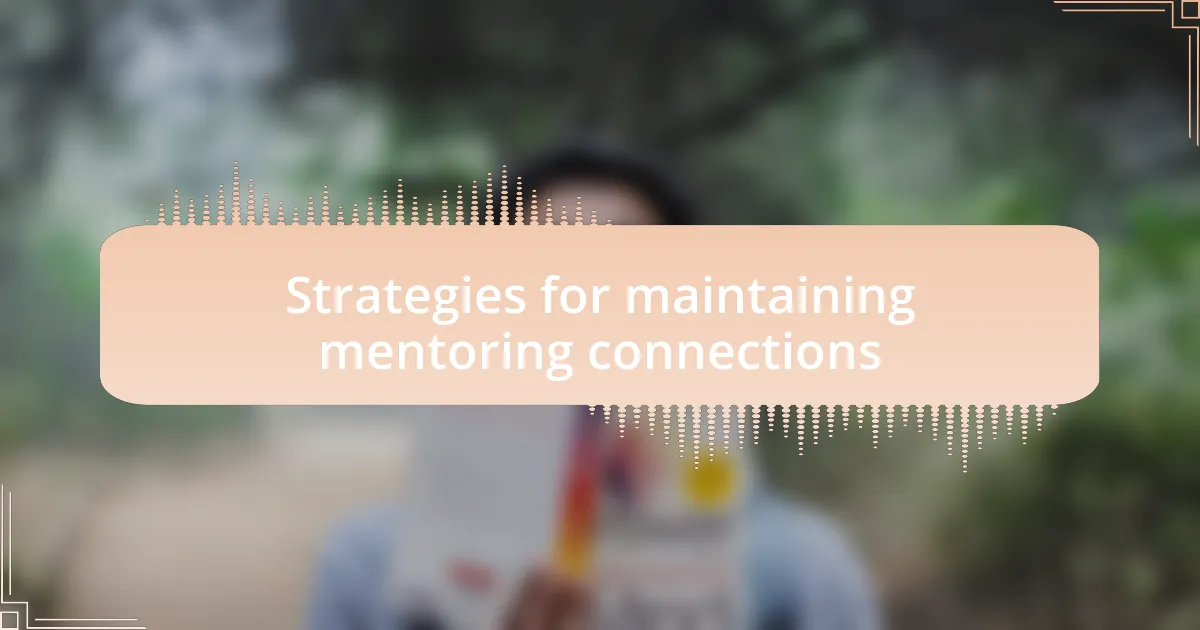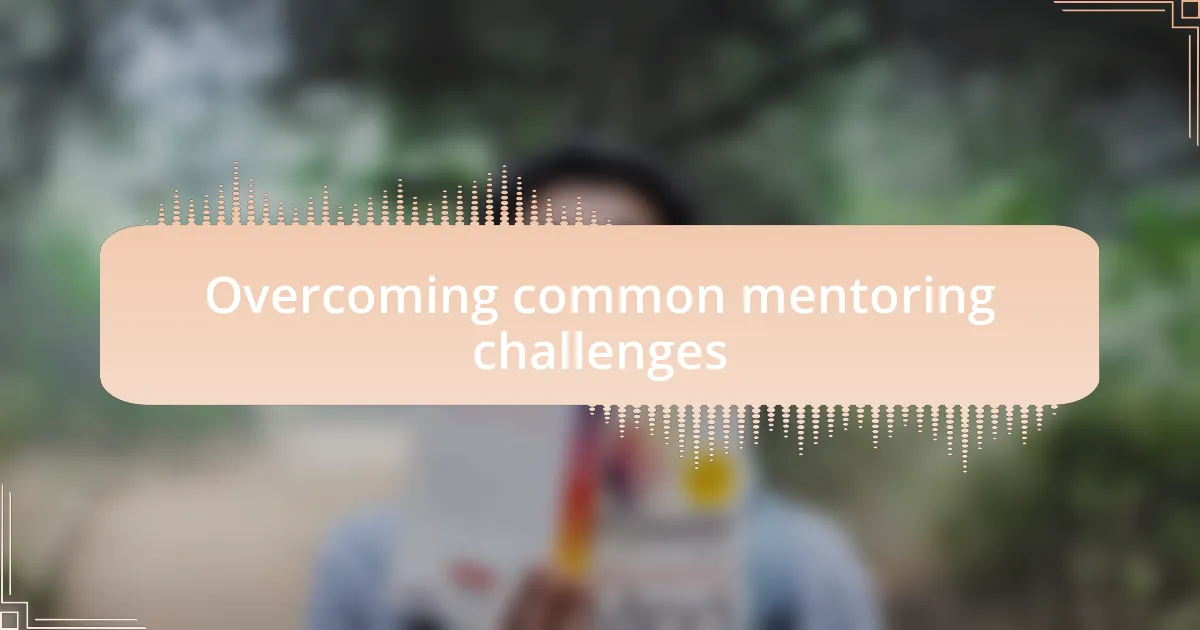Key takeaways:
- Mentoring in clinical education emphasizes the importance of trust, open communication, and emotional support, fostering both personal and professional growth.
- Effective mentoring encourages continual improvement through reciprocal relationships, enhancing confidence and critical thinking in mentees.
- Key qualities of successful mentors include empathy, adaptability to different needs, and a commitment to continuous learning, benefiting both mentor and mentee.
- Maintaining mentoring connections involves active engagement, sharing resources, and adapting to the mentee’s preferences, ensuring a supportive and productive relationship.

Understanding mentoring in clinical education
Mentoring in clinical education is not just about imparting knowledge; it is about building a relationship that fosters growth and resilience. I remember my early days when my mentor didn’t just offer clinical advice but also shared personal experiences that shaped her journey. Those stories made her guidance relatable and impactful, highlighting that mentorship is as much about emotional support as it is about academic learning.
One key aspect of effective mentoring is the importance of trust and open communication. I often ask myself: how can I truly connect with my mentees if they don’t feel comfortable sharing their struggles? Creating a safe space for dialogue ensures that mentors can address not only the clinical challenges but also the emotional hurdles that trainees may face. This two-way street strengthens the relationship and enhances learning.
Moreover, mentoring involves a commitment to ongoing development, both for the mentor and the mentee. I’ve seen how my approach evolves over time based on feedback from those I guide. Isn’t it fascinating how a mentorship can shape not just the careers of others but also our own perspectives and practices? Embracing this mutual growth is fundamental to nurturing effective relationships in clinical education.

Importance of effective mentoring relationships
Effective mentoring relationships are vital because they serve as the backbone of professional development in clinical education. I can recall a particular instance when a mentor encouraged me to take on a challenging case. This not only boosted my confidence but also helped me develop critical thinking skills that I carry with me today. These relationships empower mentees to take risks and explore their capabilities, ultimately enhancing patient care.
Trust lies at the heart of any successful mentoring relationship. I remember struggling with a difficult clinical scenario and hesitating to discuss it with my mentor. However, when I finally opened up, the guidance I received was not just about the technical aspects; it addressed my fears and uncertainties, making me feel valued. Have you ever considered how much richer your learning experience could be if you felt comfortable discussing not just the “what” but the “why” behind your challenges?
Moreover, effective mentoring fosters a culture of continual improvement. I’ve noticed that as I mentor others, I am constantly reminded of my own learning journey and areas for growth. It’s intriguing to reflect on how every interaction serves as a two-way street, enhancing our understanding of clinical practices while nurturing the next generation of professionals. This reciprocal nature of mentorship not only helps individuals grow but also strengthens the entire clinical community.

Key qualities of successful mentors
One of the most crucial qualities of a successful mentor is empathy. I recall a time when I faced an ethical dilemma in my clinical practice. My mentor didn’t just offer advice; they listened intently, allowing me to express my concerns without judgment. This empathetic approach created a safe space for dialogue, and ultimately led me to find a solution that resonated with my values. Isn’t it validating to have someone who understands your perspective while guiding you?
Another key quality is adaptability. Mentoring is not one-size-fits-all; different mentees require different support styles. I once had a mentee who thrived on structure and detailed feedback, while another preferred a more informal, discussion-based approach. Recognizing these differences and adjusting my mentoring style accordingly has allowed each relationship to flourish. How do you ensure that your mentoring methods align with the unique needs of your mentees?
Finally, a commitment to continuous learning sets successful mentors apart. I’ve always believed that being a mentor doesn’t mean having all the answers; rather, it’s about cultivating a mindset of curiosity. After helping a mentee with a complex case, I found myself researching new treatment guidelines. This not only enriched my knowledge but also demonstrated that learning never ends. Have you ever thought about how mentoring can simultaneously benefit both mentor and mentee in this way?

Steps to initiate mentoring relationships
Establishing a mentoring relationship begins with open communication. I vividly recall my first discussion with a potential mentee where I simply asked about their goals and aspirations. This moment sparked a connection that laid the groundwork for our future discussions. How often do we overlook the power of just asking someone what they want? It’s a small step that opens up pathways for deeper conversations.
Next, finding common ground is essential. I remember a situation where I connected with a mentee over similar clinical interests we both had. This shared passion not only fostered mutual respect but also encouraged candid exchanges of ideas. Isn’t it fascinating how common interests can create a bridge that transforms a simple relationship into an enriching experience?
Finally, it’s vital to set clear expectations from the outset. When I first embarked on my mentoring journey, I made it a point to discuss what both of us hoped to gain from our time together. This clarity ensured that we were aligned in our objectives and contributed to a more productive relationship. Have you considered how having defined goals impacts the effectiveness of mentorship? It can truly make all the difference in fostering a successful partnership.

Strategies for maintaining mentoring connections
Maintaining mentoring connections requires active engagement. I recall a time when I made it a point to check in with my mentee every few weeks. It wasn’t just about discussing clinical cases; we’d also share updates about our lives. This small effort created a rhythm in our relationship that kept us both invested. Have you ever thought about how regular communication can deepen a connection?
Another essential strategy is the sharing of resources and opportunities. I remember recommending a research article to my mentee that changed her perspective on a challenging topic. It not only sparked a fantastic discussion but also demonstrated my investment in her growth. Isn’t it empowering to know that sharing knowledge can illuminate new paths for someone else?
Lastly, flexibility is crucial in nurturing these relationships. I once adjusted my mentoring style to better suit my mentee’s learning preferences. This openness to adapt helped us navigate a challenging project together and strengthened our bond. Have you considered how being responsive to a mentee’s needs can enhance the mentoring experience? It’s a dynamic that fosters trust and collaboration, making both mentor and mentee grow.

Overcoming common mentoring challenges
Overcoming mentoring challenges often begins with open dialogue. I once faced a situation where my mentee seemed hesitant to share her struggles. By initiating a candid conversation about my own challenges, we created a safe space that encouraged her to open up. Have you ever noticed how vulnerability can bridge gaps in understanding?
Another common hurdle is misalignment of expectations. Early in my mentoring journey, we scheduled regular meetings, but I didn’t clarify what each of us hoped to achieve. This lack of clarity led to frustration until we took a step back to realign our goals. Have you experienced the relief that comes from having a clear vision for the mentorship?
Being mindful of different communication styles can also help tackle these challenges. I recall mentoring a colleague who preferred brief, concise feedback, whereas I naturally leaned towards detailed discussions. By recognizing this difference and adjusting my approach, I saw her confidence blossom. Isn’t it remarkable how a small change can make a significant difference in communication?

Personal experiences and lessons learned
I remember one particular mentoring relationship where trust played a pivotal role. My mentee was grappling with self-doubt, and I decided to share my own struggles with similar feelings during my early career. It was eye-opening to see how my transparency not only deepened our connection but also helped her realize that such challenges are a normal part of growth. Have you ever found that sharing your personal story can lighten someone else’s burden?
Another lesson I learned was the importance of celebrating small wins. In one instance, my mentee achieved a milestone in her research but brushed it off as trivial. I took the time to acknowledge her efforts, and she visibly brightened. It struck me then how essential it is to validate progress, no matter how small. Doesn’t it feel rewarding to have someone recognize your hard work?
Lastly, I discovered the value of flexibility in mentoring. I once approached a session with a rigid agenda, but it quickly became apparent that my mentee was struggling with a specific issue that needed addressing. By allowing our conversation to flow organically, we uncovered insights that were far more valuable than sticking to a planned outline. Isn’t it fascinating how being open to spontaneity can lead to unexpected breakthroughs?